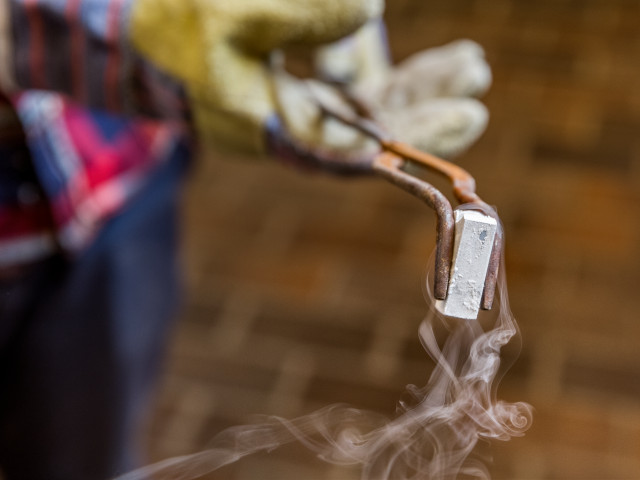The course focuses on explaining how sustainable metal production in a modern industry is a part of the circular economy in society. Here, the fundaments of metal production are given based on both ore raw materials and recycled materials, with examples from iron and steel production, aluminium production, copper production and metal powder production. Furthermore it is explained how basic thermodynamic and kinetic theories can be used to optimise metal production.
MH2054 Materials Processes I 7.5 credits

The course focuses on explaining how a sustainable production of metal in a modern industry is part of the circular economy in a society. A basic knowledge is given with respect to the production of metals based on both ore and recirculated metal exemplified with the production of steel, copper and aluminium as well as the production of metal powders. In addition, it is explained how basic thermodynamic and kinetic theories can be used in the optimization of metal production.
Information per course offering
Information for Autumn 2025 Start 25 Aug 2025 programme students
- Course location
KTH Campus
- Duration
- 25 Aug 2025 - 24 Oct 2025
- Periods
Autumn 2025: P1 (7.5 hp)
- Pace of study
50%
- Application code
50919
- Form of study
Normal Daytime
- Language of instruction
English
- Course memo
- Course memo is not published
- Number of places
Min: 10
- Target group
- Open for application for CMATD3 and TTMVM1. Elective for all programs as long as it can be included in your programme.
- Planned modular schedule
- No information inserted
- Schedule
- Part of programme
Degree Programme in Materials Design and Engineering, year 3, INE, Mandatory
Degree Programme in Materials Design and Engineering, year 3, MMM, Mandatory
Degree Programme in Materials Design and Engineering, year 3, NTE, Mandatory
Degree Programme in Materials Design and Engineering, year 3, PRM, Mandatory
Degree Programme in Materials Design and Engineering, year 3, TEMB, Mandatory
Degree Programme in Materials Design and Engineering, year 3, TMV, Mandatory
Master's Programme, Engineering Materials Science, year 1, Mandatory
Degree Programme in Materials Design and Engineering, year 3, Mandatory
Master's Programme, Engineering Materials Science, year 1, Mandatory
Contact
Course syllabus as PDF
Please note: all information from the Course syllabus is available on this page in an accessible format.
Course syllabus MH2054 (Autumn 2025–)Content and learning outcomes
Course contents
Intended learning outcomes
After passing the course, the student should be able to:
- Analyse the basic processes for metal production and explain how a sustainable metal production is a part of the circular economy.
- Analyse and apply basic kinetic and thermodynamic theories to evaluate metal production processes.
- Analyse and explain how an industrial process chain for metal production is built-up.
Literature and preparations
Specific prerequisites
In total 90 higher education credits in the main field of study of Technology.
Literature
Examination and completion
Grading scale
Examination
- LAB1 - Computer assignment, 1.0 credits, grading scale: P, F
- STU2 - Study trip, 0.5 credits, grading scale: P, F
- KON1 - Partial exam, 6.0 credits, grading scale: A, B, C, D, E, FX, F
Based on recommendation from KTH’s coordinator for disabilities, the examiner will decide how to adapt an examination for students with documented disability.
The examiner may apply another examination format when re-examining individual students.
If the course is discontinued, students may request to be examined during the following two academic years.
Examiner
Ethical approach
- All members of a group are responsible for the group's work.
- In any assessment, every student shall honestly disclose any help received and sources used.
- In an oral assessment, every student shall be able to present and answer questions about the entire assignment and solution.
Further information
Course room in Canvas
Offered by
Main field of study
Education cycle
Supplementary information
The course MH1022 Fabrication Processes of Metals and Bio Fibres 7.0 credits has from HT23 been replaced by the course MH2054 Materials Processes I 7.5 credits